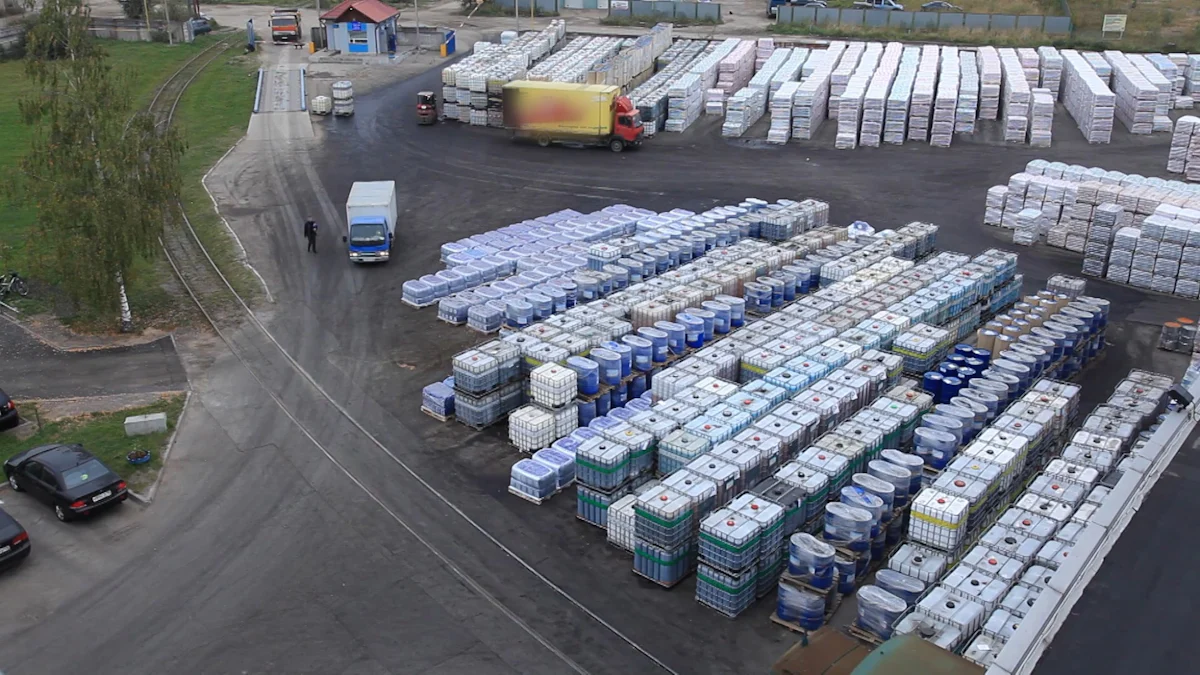Supply Chain Resilience for Enterprises Facing Global Challenges

Global uncertainties challenge businesses daily. Supply chain resilience ensures your operations stay uninterrupted, even during disruptions. Flexible supply chains reduce risks, improve performance, and enhance customer trust. They also save costs by preventing disruptions and optimizing inventory. By navigating uncertainty effectively, you gain a competitive edge and maintain strong relationships with partners and customers.
Key Takeaways
Supply chain resilience helps companies bounce back from problems. It gets ready for surprises and adjusts to new situations.
Do detailed risk checks to find weak spots. This careful planning makes your supply chain stronger and more flexible.
Use tools like AI and IoT to improve supply chains. These technologies make work faster, clearer, and help solve problems quickly.
Understanding Supply Chain Resilience
Defining Supply Chain Resilience
Supply chain resilience refers to the ability of a supply chain to recover from disruptions while maintaining its essential functions. This includes handling challenges like natural disasters, supplier failures, or economic downturns. A resilient supply chain doesn’t just focus on avoiding disruptions. It prepares for unexpected events, adapts to changes, and recovers quickly to restore normal operations. This approach allows businesses to turn challenges into opportunities for growth and improvement.
Key Characteristics of a Resilient Supply Chain
A resilient supply chain possesses several key attributes that enable it to withstand and recover from disruptions effectively. These include:
Flexibility: The ability to adjust to changing market conditions and customer demands.
Adaptability: A willingness to innovate and embrace change to improve efficiency.
Recovery: The capacity to mobilize resources and restore operations swiftly after disruptions.
Sustainability: Practices that minimize negative impacts during recovery efforts.
Risk Management: Strategies to assess and mitigate risks, ensuring operational continuity.
These characteristics work together to create a robust system that can handle uncertainties while maintaining business performance.
The Risks of a Fragile Supply Chain
A fragile supply chain exposes your business to significant risks. Supply chain disruptions can lead to delayed deliveries, increased costs, and dissatisfied customers. Without proper risk management, even minor disruptions can escalate into major operational challenges. A lack of flexibility and adaptability makes it harder to respond to unexpected events, leaving your business vulnerable. Building resilience ensures you can navigate these risks effectively and maintain a competitive edge.
Strategies to Build Supply Chain Resilience

Conducting Comprehensive Risk Assessments
A strong supply chain begins with understanding its vulnerabilities. Conducting comprehensive risk assessments allows you to identify and address potential threats systematically. Follow these steps to strengthen your supply chain resilience:
Identify risks by evaluating vendor relationships and pinpointing areas of exposure.
Analyze these risks to determine their likelihood and potential impact.
Develop risk mitigation strategies, such as contingency plans and employee training.
Implement monitoring systems to track risks and ensure compliance with industry standards.
Adhere to regulations like ISO 28000 to maintain accountability and trust.
This structured approach ensures you can navigate uncertainty effectively and maintain operational flexibility during disruptions.
Supplier Diversification and Geographic Flexibility
Relying on a single supplier or region increases your vulnerability to supply chain disruptions. Diversifying suppliers and production locations spreads risk and ensures continuity. Geographic flexibility offers several advantages:
Reduces the impact of regional disruptions, such as natural disasters or political instability.
Ensures a steady supply of materials, even if one region faces challenges.
Provides access to new markets and cost-efficient regions.
Simplifies compliance with regional regulations.
By diversifying, you build a resilient supply chain capable of adapting to unexpected changes.
Leveraging Technology for Supply Chain Optimization
Modern technology transforms supply chain operations, enhancing efficiency and visibility. Tools like AI and machine learning improve forecasting, preventing stockouts and overstocks. IoT enables real-time monitoring, while blockchain ensures secure record-keeping. Data analytics provides actionable insights, and robotic process automation streamlines repetitive tasks. These advancements empower you to optimize operations and respond swiftly to challenges.
Building Collaborative Supplier Relationships
Strong supplier relationships enhance supply chain resilience. Collaborative efforts allow you to conduct joint risk assessments and share resources during disruptions. For example, companies in the automotive industry pooled resources during the 2011 tsunami in Japan to mitigate supply chain disruptions. Effective communication frameworks reduce response times and improve coordination, ensuring smooth operations even during crises.
Workforce Training for Supply Chain Agility
Your workforce plays a critical role in maintaining flexibility and agility. Training programs focused on agile methodologies, supply chain management, and technology usage prepare your team to handle challenges effectively. By equipping employees with the right skills, you create a responsive and adaptable supply chain that thrives in dynamic environments.
Addressing Supply Chain Challenges with JUSDA
JUSDA’s Role in Enhancing Supply Chain Resilience
JUSDA plays a pivotal role in helping you overcome the most significant challenges in maintaining supply chain resilience. These challenges include balancing expenses, managing complex supply chains, ensuring compliance, and fostering collaboration among stakeholders. JUSDA’s innovative solutions address these issues by streamlining operations and enhancing efficiency.
For example, material scarcity often disrupts production. JUSDA’s extensive network and supplier diversification strategies help you secure raw materials like glass, plastics, and metals, reducing delays. Additionally, JUSDA’s cost-effective logistics solutions mitigate rising costs, ensuring your supply chain remains financially flexible. By integrating advanced technologies, JUSDA enables you to maintain compliance and adapt to evolving regulations seamlessly.
Challenge | Description |
|---|---|
Increased Material Scarcity | Shortages of raw materials, such as glass, plastics, lumber, and metals, can cause delays in production. 61% of respondents cited this as a top disruption. |
Higher Costs | Raw material shortages can lead to increased costs for supplies, affecting profits and customer prices. |
Supplier Diversification | Businesses are addressing shortages by diversifying suppliers and improving vendor communication. |
How JUSDASR Supports Cross-Border Supply Chain Efficiency
JUSDASR simplifies cross-border logistics, empowering you to expand globally with confidence. Its strategic warehouse locations across the United States ensure quick distribution and cost savings. By partnering with major carriers like FedEx and UPS, JUSDASR guarantees reliable last-mile delivery.
This service also supports dropshipping, allowing you to manage inventory efficiently and respond to market demands swiftly. Specialized solutions for high-power energy storage products ensure compliance and secure delivery. With competitive first-leg transportation costs, JUSDASR reduces expenses while maintaining efficiency. These features make JUSDASR an ideal choice for businesses navigating the complexities of cross-border supply chains.
Leveraging JusLink for Real-Time Supply Chain Visibility
JusLink enhances your supply chain operations by providing real-time visibility and actionable insights. Its real-time updates reduce communication costs and improve decision-making. Big data analysis predicts potential issues, enabling you to resolve them early and explore new opportunities.
JusLink’s one-stop solutions integrate core and value-added services, offering you customized options tailored to your needs. This platform ensures seamless collaboration across your supply chain, helping you maintain efficiency and adapt to challenges effectively. By leveraging JusLink, you gain a competitive edge through improved transparency and operational control.
Real-World Examples of Supply Chain Resilience

Case Study: JUSDA’s Collaboration with Global Manufacturers
JUSDA’s collaboration with global manufacturers highlights how strategic partnerships enhance supply chain resilience. For example, JUSDA worked with Sharp, a leading electronics manufacturer, to address supply chain complexities. By implementing its Supply Chain Management Collaboration Platform, JUSDA optimized Sharp’s global e-commerce logistics. This partnership reduced logistics costs by 20% and improved order processing cycles.
JUSDA’s approach focused on demand forecasting, transport coordination, and inventory management. These strategies ensured timely deliveries and minimized disruptions. By leveraging advanced technologies, JUSDA helped Sharp achieve operational efficiency and profitability. This case demonstrates how you can strengthen your supply chain by adopting innovative solutions and fostering collaborative relationships.
Lessons from JUSDASR’s Cross-Border Logistics Success
JUSDASR’s success in cross-border logistics offers valuable lessons for businesses navigating global markets. Key takeaways include:
Combining global reach with local expertise to tailor solutions for specific markets.
Enhancing competitiveness through localization strategies, especially in North America.
Using advanced digital tools for inventory management and real-time tracking to optimize operations.
These practices enable you to address cross-border challenges effectively. By adopting similar strategies, you can improve supply chain efficiency and expand your global presence confidently.
Technology-Driven Resilience in Action
Technology plays a crucial role in building supply chain resilience. Companies like Amazon use AI algorithms for inventory management and robots in fulfillment centers to speed up order processing. Maersk Line partnered with IBM to create the TradeLens platform, which uses blockchain to improve transparency and reduce shipping paperwork. Nestlé employs IoT sensors to monitor product conditions during transit, ensuring food safety.
These examples show how technology enhances resilience by predicting disruptions, improving real-time monitoring, and fostering trust among partners. For instance, DHL’s integration of AI achieved 95% accuracy in demand forecasting, optimizing courier routes and improving customer satisfaction. By leveraging these technologies, you can strengthen your supply chain and adapt to challenges effectively.

JUSDA Solutions
To provide you with professional solutions and quotations.
Supply chain resilience is essential for overcoming global challenges. It ensures adaptability, agility, and operational continuity. Key takeaways include the role of advanced technology, digital transformation, and robust strategies in mitigating disruptions.
To enhance resilience, you can:
Build strategic partnerships for stronger networks.
Train employees to handle challenges effectively.
Use IoT for real-time visibility and data-driven decisions.
Leverage AI and blockchain to optimize operations.
Proactive measures today secure your business against tomorrow’s uncertainties.
See Also
Addressing Global Supply Chain Growth Challenges Effectively
Implementing Sustainable Strategies to Mitigate Supply Chain Risks
Prioritize Supply Chain Risks: Safeguard Your Business Now
Boosting Supply Chain Efficiency Through Cloud Technology
Stay Ready: JUSDA's Risk Management for Strong Supply Chains
